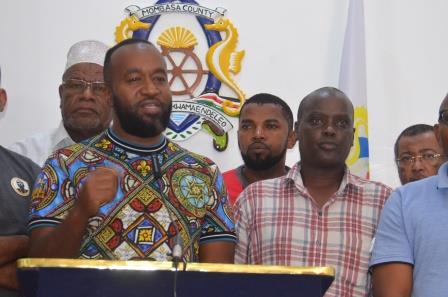Corruption and unequal distribution of public resources took center stage during the Building Bridges to Unity Advisory Taskforce forum held in Makueni County on Thursday.
While presenting their views to the taskforce, residents of Makueni said skewed allocation and plunder of government resources were to blame for negative ethnicity and cyclic post-election violence.
“Ethnic antagonism is brought when some Kenyans feel left out. We should strive for inclusivity and equity to bring harmony and peace in the country,” said Gideon Mulili a resident.
Mulili noted that the government should remain committed in the fight against corruption and recover resources stolen from the public coffers and punish corrupt government officials irrespective of their positions.
“Measures taken to fight corruption should be punitive to discourage others from getting involved in the vice,” he said.
On public funds, the locals called for the review of the formula used to allocate resources to the counties.
Former Nguumo MCA, John Mwenze said the current parameters of population, poverty levels, size of the county and fiscal responsibility used by Commission on Revenue Allocation (CRA) were unfair and only widened gap between the rich and marginalized counties.
Mwenze said that equal distribution of resources would bring the much needed reconciliation in the country that would foster unity and development.
“It will be difficult for Kenya to achieve true reconciliation if resources are not fairly shared,” said the former MCA.
He also called for more resources to be devolved in the counties to strengthen devolution and empower service delivery.
“Devolution is the antidote to competitive politics in the country that cause animosity and more resources should be allocated to the devolved units to reduce the negative competition,” added Mwenze.
On political parties, the locals lamented about the high number of parties in the country, saying they were tribal outfits which divided Kenyans along ethnic lines.
They proposed for a legislation that would pave for the creation of only three political parties whose ideologies would unite the country.
“While multiparty is good for democracy, the many political parties in the country do us more harm than good and should be reduced to three,” said Peter Munyae.
Speaking at the same event, the Makueni Senator, Mutula Kilonzo Jr. called on the taskforce to fast track the process of collecting views from Kenyans and present the report to Parliament for adoption in a record time.
Mutula noted that should the proposals by Kenyans amount to constitutional amendments, the referendum should also be fast tracked to allow Parliament to enact laws that would support the constitutional changes.
“The latest we should have a referendum is 2020 to give the legislature ample time to come up with relevant laws,” the senator said, adding the referendum should not be contentious for Kenyans to understand it.
“The referendum questions should be simple and straight forward for the electorate to understand and vote for the changes,” he added.
He also called for staggering of general elections and reduction of elective posts to reduce the burden on tax payers.
“The presidential election should be separated from other elections to avoid repeated disagreements that have been witnessed after every five years in the country.
The Garissa Senator, Yusuf Haji who is also a member of the taskforce called on Kenyans to inculcate the values of integrity in children and mentor them to be responsible people.
“Let us teach our children honesty and integrity values such that when they grow up they will be responsible citizens,” said Haji.
Haji also asked Kenyans to be patriotic and love one another.
By Roselyne Kavoo



